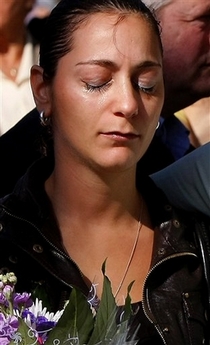UK terror chief warns of long fight
(AP)Updated: 2007-07-09 08:38
LONDON - Britain's new security chief warned on Sunday that the battle against domestic militancy could take up to 15 years, and said Britons must start sharing information about neighbors they suspect of involvement in terrorism.
 A woman reacts as she waits to lay a bouquet of flowers in a memorial garden outside King's Cross Station in London, to mark the second anniversary of the London bombings, Saturday July 7, 2007. [AP]  |
One of those approaches included challenges to the British psyche, he said.
"Britishness does not normally involve snitching or talking about someone," he told The Sunday Telegraph. "I'm afraid, in this situation, anyone who's got any information should say something because the people we are talking about are trying to destroy our entire way of life."
He said preventing the radicalization of young British Muslims was his top priority.
"This is not a quick thing," he said. "I believe it will take 10 to 15 years. But I think it can be done as long as we as a nation apply ourselves to it and it's done across the board."
Meanwhile, authorities acknowledged no armed police were on duty at Glasgow airport June 30 when two men crashed a Jeep Cherokee laden with gas cylinders and gasoline into the main terminal.
"Armed officers are only deployed to the airport when the national threat level requires it," a Strathclyde police spokesman said on condition of anonymity because department policy barred him from speaking for attribution.
Britain's terrorism threat level was "severe" at the time of the attack - the second-highest level, which means an attack is highly likely. It remains at that level.
It is up to individual police forces to decide how to deal with the threat level, a Home Office spokeswoman said on condition of anonymity in line with department policy.
Most police throughout Britain do not carry firearms out of the philosophy that arming police makes criminals feel justified in carrying weapons. However, all forces have specially trained firearms teams ready for rapid deployment.
The two men arrested following the Glasgow attack were overpowered by an unarmed officer, an off-duty policeman and members of the public. Armed police have been on duty at the airport since the attack.
Eight people are in custody in connection with the attacks - seven in Britain and one in Australia. Most of the suspects worked for Britain's health service and come from countries in the Middle East and India. One has been charged: Bilal Abdullah, a 27-year-old doctor born in Britain and raised in Iraq.
Two cars packed with gas cylinders and nails were discovered June 29 in the busy heart of London's West End - one outside a crowded nightclub, the other near Trafalgar Square. The next day, a Jeep Cherokee smashed in flames into the security barriers at Glasgow airport.
|
|
|
||
|
||
|
|